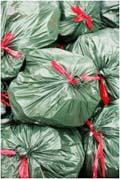What is Recycling?

Recycling is the process of taking a product that can no longer be used and making another product from all or part of it. The internationally-recognized symbol for recycling is three arrows moving in a triangle. Each arrow represents a different part of the recycling process, from collecting used materials, to re-manufacturing them into new products, and then reselling them.
Why Recycle?

Recycling offers many advantages, including:
by Rhonda Sherman, Extension Specialist
- Reduces the consumption of raw materials
- Decreases air and water pollution
- Lowers energy usage
- Reduces the need for more landfill space
- Creates jobs
- Reduces waste disposal costs
- Generates revenues from the sale of recyclable materials
- Provides raw materials for industry
- Keeps habitats intact
- Reduces greenhouse gas emissions
Recycle these items that are banned from NC landfills
- Aluminum cans
- Appliances
- Antifreeze
- Beverage containers from ABC permitted facilities
- Computer equipment
- Lead-acid batteries
- Motor oil
- Motor oil filters
- Oyster shells
- Plastic bottles
- Scrap tires
- Televisions
- Wooden pallets
- Yard debris (leaves, grass, branches, etc.)
Recycling Resources
Recycling Extension Publications
by Rhonda Sherman, Extension Specialist
North Carolina Recycling Information
- Division of Environmental Assistance and Outreach
- RecycleMore NC
- Carolina Recycling Association
- Recycling Business Assistance Center
- North Carolina Department of Environmental Quality